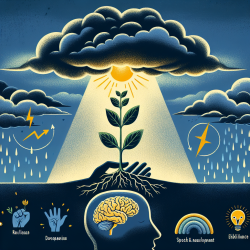As a speech-language pathologist, you are likely aware of the unique challenges faced by children with rare genetic conditions like Kabuki Syndrome. A recent study titled A Qualitative Study to Characterize the Humanistic Burden of Kabuki Syndrome in the United States and Canada sheds light on the multifaceted impact of this condition. Understanding these findings can significantly improve the outcomes of your therapy sessions and encourage you to delve deeper into this area of research.
Understanding Kabuki Syndrome
Kabuki Syndrome is a rare congenital condition characterized by unique facial features, skeletal abnormalities, developmental delays, and a range of other health issues. The study conducted a survey with 68 participants (57 caregivers and 11 adolescents) to gather comprehensive data on the physical, mental, emotional, and social impacts of living with Kabuki Syndrome.
Key Findings
- Developmental Delays: Children with Kabuki Syndrome exhibit significant delays in reaching developmental milestones such as crawling, walking, and speaking.
- Educational Challenges: Many children require special education and face difficulties in subjects like writing and math. Individualized education plans and school aids are commonly needed.
- Daily Activities: Tasks such as washing hair, pronouncing words, and bathing are often rated as extremely difficult by caregivers.
- Cognitive Impairment: IQ scores for children with Kabuki Syndrome range from 40 to 91, with difficulties in areas like problem-solving, memory, and spatial relations.
- Emotional and Social Impacts: Anxiety and frustration are common, although adolescents reported these impacts less frequently than caregivers.
Implications for Practitioners
The study highlights the need for a multidisciplinary approach to managing Kabuki Syndrome. Here are some practical steps you can take:
- Customized Therapy Plans: Develop individualized therapy plans that address the specific developmental delays and cognitive challenges faced by each child.
- Collaborate with Educators: Work closely with teachers and special education professionals to ensure that children receive the necessary accommodations in school.
- Family Support: Provide resources and support to caregivers, helping them navigate the emotional and social challenges associated with Kabuki Syndrome.
- Further Research: Encourage further research into the emotional and social impacts of Kabuki Syndrome to better understand and address these aspects.
Conclusion
This study provides valuable insights into the complex nature of Kabuki Syndrome and underscores the importance of a holistic approach to therapy. By incorporating these findings into your practice, you can help improve the quality of life for children with Kabuki Syndrome and their families.
To read the original research paper, please follow this link: A Qualitative Study to Characterize the Humanistic Burden of Kabuki Syndrome in the United States and Canada.










